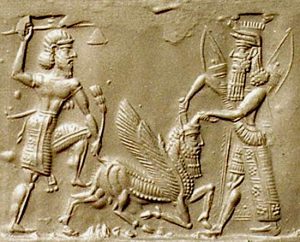October 9, 2019 at 9:01 am
Earlier this week, Core alumna Cat Dossett shared with us some vintage Halloween tunes.
Check them out here!
Whether it is for your Halloween themed gatherings or just for your own enjoyment, this tunes will help you get into the Halloween spirit.
Thank you for sharing, Cat.
By CAS Core Curriculum
|
Posted in Uncategorized
|
October 8, 2019 at 3:36 pm
We have received our first postcard of the semester from our good friend Priest. He writes us from California:
"To those who have profoundly influenced me:
Tis Autumn, yet California refuses to relinquish its summer-a high of 33 degrees celsius this week; woe to the republic. Elsewise, the season had me in many a mood, one of which is the mood of sending postcards, a means of sending love and thought. I hope everyone is well.
Core post-Nelson must be a strong domain. Postcards are an exercise in succinctness-I'm sure Hemingway would have approve.
Hope you are all well."
*some edits were made for clarity due to sentences cut off by postage
By hjdion
|
Posted in Uncategorized
|
May 6, 2019 at 3:15 pm

From Seth Godin in his though-provoking blog, asking how we define the value of education. His thoughts below, and more here:
While a high-status college admission confers a measure of status, it doesnt automatically grant a great education.
Sometimes, a student gets both, but not always. Because learning is taken as much as given.
Along the way, many of us have conflated the status with the learning.
Were also confused about the correlation between big college sports and the expected outputs of a university.
One symptom: We often say good college when we mean famous college.
And so, the college one goes to doesnt tell us very much at all about what someone learned, or even about who they are. It merely demonstrates that when they were 18 years old, a combination of luck and signaling led to them being chosen (or not).
Its not personal. And its not predictive. Unless we allow it to be.
By hjdion
|
Posted in Academics
|
Tagged blog, college, contributors, education
|
April 10, 2019 at 11:38 am
Caroline Brantley, Core alumna '18 and CAS '19, appeared on CNN last week talking about the 2020 election. The clip can be viewed below:
By CAS Core Curriculum
|
Posted in Uncategorized
|
March 26, 2019 at 3:11 pm
Our Core alumna sent us a digital postcard all the way from Paris! Thank you to Hannah Jew for her note.

As a conversation with a certain little Cat revealed that my real postcard got lost dans la poste, a digital postcard:
Dear Core,
I hope the semester back home is moving along swimmingly. Here in Paris, I've been enjoying the historic Caveau de la Huchette, home to jazz luminaries and down the street from Shakespeare and Co, the closest thing I can find to a Parisian Core Office (no photos allowed, sadly). Their motto- Live For Humanity. Sounds like one of our t shirts, non?
With love,
Hannah
* Corelovespostcards. Whether youre at home or abroad now, wed love to get one from you. Our address is easy: Core Curriculum, Boston University, Boston MA 02215.
By CAS Core Curriculum
|
Posted in Uncategorized
|
Tagged alumni update, postcards
|
March 22, 2019 at 10:47 am

I think this is how Johann Sebastian Bach would have wanted to be remembered-- with an interactive AI on the homepage of a massive search engine.
Today's Google Doodle allows the user to input their own melody and create a four-part Bach-esque piece. The machine analyzed 306 Bach compositions to learn how to recognize patterns and harmonies, and uses this knowledge to emulate Bach's signature style. Try it for yourself here!
By hjdion
|
Posted in Curriculum
|
Tagged Bach, Composition, Doodle, google, music
|
March 20, 2019 at 12:18 pm

Anyone with an Instagram account should recognize this kind of poetry- printed in a typewriter font, preaching love and positivity, and never more than a few words in a few lines. "Instapoets" have become a new sensation, with these writers collecting thousands to millions of followers for their craft. And why not? The images are aesthetically appealing, and the short universal phrases could provide comfort and familiarity to anyone.
Well, some critiques argue that it isn't poetry at all. Even R.M. Drake, an Instapoet with 1.9 million followers, has said that he does not consider his own work poetry. Others agree by saying it is too simple, too universal, and too much like commercial products. But Instapoets have defended themselves against what they view as this elitist criticism- Amanda Lovelace said that the term "Instapoets" itself is used to separate them from "real poets" aka dead white, straight, cisgender, males." As opposed to some more esoteric poetry, Instagram poetry is both easily accessible and easily understood by the general public. So are Instapoets letting poetry evolve and survive in the new digital world, or destroying it all together?
By hjdion
|
Posted in Uncategorized
|
Tagged poetry, social media
|






